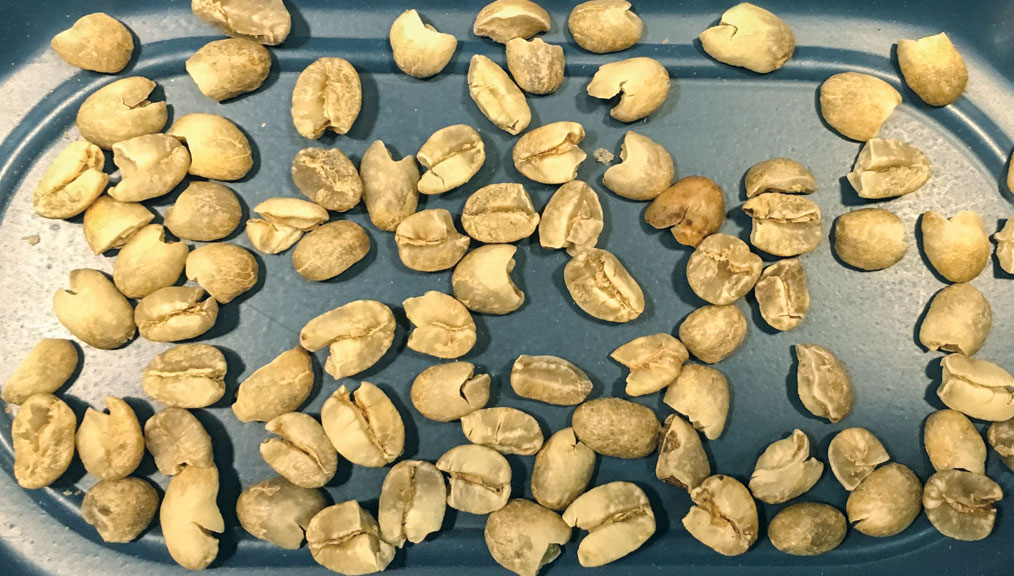[T]he first step in processing washed coffees is depulping: forcibly removing the coffee cherry skin (also called pulp) from the bean inside. After the pulp is removed from the underlying mucilage and parchment comes scrubbing, sometimes fermenting, then drying. Depulping is a necessary part of washed processing, but damage in this stage poses a threat to the coffee’s value.
Depulping equipment typically consists of two metal pieces grinding against each other in order to squeeze the cherries through. Enrique Navarro of Microbeneficio Monte Copey in San Marcos, Tarrazú, Costa Rica, has spent the last seven years perfecting processing. “Parchment protects a bean,” Navarro says. “If that layer is damaged as early as depulping, then the bean will suffer in each subsequent stage. Mucilage can cling to [the inner part of] a bean, causing ferment or the entrance of mold.”
When beans are flattened or mordido (Spanish for bitten) in processing, it creates an uneven surface, which may cause beans to dry too quickly, risking long-term quality. “Mechanical damage also threatens the overall output of the mill, affecting producers’ pockets,” says Navarro.
Timothy Hill is the coffee buyer and quality manager for Counter Culture Coffee in Durham, North Carolina. He sees pulper damage in coffees sourced from a variety of production environments. “It’s not just smallholders or smallholder cooperatives that struggle with pulper damage. There are very few washed coffees that are free of it,” Hill says.

The challenge of reducing pulper damage in washed coffees concerns all growing regions and costs producers money they would earn for otherwise healthy coffee. Beans with severe pulper damage will preclude a sample from evaluation by specialty roasters and a lot is devalued by any pulper defects.
I first observed the potential destructiveness of pulpers on a farm growing commodity coffee outside of Ciudad Bolivar, Antioquia, Colombia. In this region, producers depulp and wash coffee, then sell it to co-ops or brokers in parchment. Producers are paid precisely for the quality of each lot of coffee they deliver based on a hulled sample hand-sorted to determine defect percentage.
After watching coffees repeatedly docked based on defect count, I categorized the defects by insect damage, discolored or misshaped, and machine damage. Almost half the defects were flattened or pitted beans damaged by the depulper. This seemed shocking because the problem is comparatively solvable. Insect infestations, malnourished beans, blight, or insufficient drying times indicate systemic issues of adapting to larger environmental issues and strategizing overall farm management. In contrast, a malfunctioning depulper is a quick fix that immediately increases producers’ payouts—not by much, but every dollar counts.
Farmers who use depulpers generally know how to maintain them, but troubleshooting mechanical equipment is a skill set separate from the rest of coffee cultivation, and it’s an area where many producers would benefit from support.
Chalo Fernandez, a specialty coffee producer in Huila, Colombia, describes the complexity of the situation. “We do our best to keep all of our mechanical infrastructure operating smoothly by ourselves, but due to limited finances, limited experts with knowledge and experience who are busy and/or have to travel long distances to reach the farm, and poor mobile signal to reach these engineers or technicians, sometimes our problem solving is more reactive than proactive,” Fernandez says.
Shifting to proactive equipment maintenance is the goal, one that is being achieved through one direct-trade partnership. Tim Trebilcock, of Trebilcock Coffee Roasters in Ajax, Ontario, is a toolsmith by trade and is leading the design of a carefully thought out preventive maintenance program. Trebilcock says the program will “help the farm run breakdown free, protect the integrity of the quality of the coffee, and can allow for annual maintenance budget to be accurately assessed.”
A belt drive might not be the most glamorous investment to showcase back at the coffee shop, but sometimes identifying and meeting simple needs is the most meaningful action.
Not only does better functioning equipment mean producers can earn more from their coffee, it means spending less on emergency repairs. Fernandez explains, “We know how to grow coffee; that’s what we’ve done for years. But now we have new, more efficient mill technology to adapt to. Our roaster partners apply their specific expertise, making it a true exchange of skills and knowledge.” Since tools like welding torches and drills are also much cheaper in the US, Trebilcock and other roasters have sent containers of equipment to Fernandez’s farm. A belt drive might not be the most glamorous investment to showcase back at the coffee shop, but sometimes identifying and meeting simple needs is the most meaningful action.
The preventive maintenance project began after a depulper at Fernandez’s farm caused belts to snap last harvest, halting processing for as much as a day at a time and threatening the quality of coffee that demands immediate processing. This and other hurdles occur long before coffee makes it to a cupping table. In the samples that specialty roasters evaluate, the most severely damaged beans have already been sorted out, and producers have silently taken the hit for that loss in coffee that might have been sold for a premium.
From Hill’s perspective, the minor, inevitable pulper damage occurring in specialty coffee does not hugely impact quality. “Roasters can pay attention and calibrate to when it’s an issue and when it’s not,” Hill says. “We approved a coffee with over fifty percent pulper damage with a five-person panel unanimous score of 84 points.”
Pulper damage is far from the gravest problem at origin and, to a degree, is unavoidable because beans vary widely in size. But preventative maintenance to avoid unnecessary losses from malfunctioning equipment is one improvement that’s becoming more accessible to producers and keeping more coffee as special as it should be, which is a win for everyone.
—Rachel Northrop is a regular contributor and a sales rep with Ally Coffee.
















